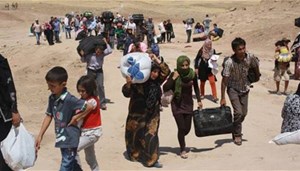Middle East Online
FALLUJAH – Iraqi forces on Monday said jihadist fighters were attempting to flee Fallujah by blending in with civilians who have been escaping the besieged city in their thousands in recent days.
The Pentagon said meanwhile that US Apache helicopters hit an Islamic State group target for the first time in Iraq, in the north of the country.
More than 500 suspected IS members have been arrested trying to sneak out with civilians since forces ramped up efforts to retake Fallujah, one of the group’s most emblematic bastions, two weeks ago.
“We have arrested 546 suspected terrorists who had fled by taking advantage of the movements of displaced families over the past two weeks,” said Hadi Rzayej, the police chief for Anbar province in which Fallujah is located.
“Many of them were using fake IDs,” he said from the southern edge of Fallujah, where Iraqi forces are pressing a three-week-old offensive to retake the city from IS.
When civilians reach government forces, teenage boys and adult men are screened separately. Some are released after a few hours while others undergo more thorough interrogation.
“Daesh (IS) is fleeing among the civilians, we have arrested many and are investigating the suspects,” said Abdelwahab al-Saadi, the overall commander of the operation.
Until last week, an estimated 50,000 civilians were still trapped in the centre of the city, which is one of the jihadist group’s last bastions in Iraq and lies only 50 kilometres (30 miles) west of Baghdad.
The Iraqi army on Saturday opened a corridor to the southwest of the city that has allowed thousands of civilians to escape IS rule and reach displacement camps.
UN deputy representative to Iraq Lise Grande said on Monday that more than 7,000 people have fled Fallujah in recent days using the safe corridor set up by Iraqi forces, who were working on opening a second protected route.
– Street battles –
Yet the flow of residents fleeing via the corridor and through the Al-Salam intersection to the southwest of the city appeared to dry up on Monday, the Norwegian Refugee Council’s regional media adviser Karl Schembri said.
“We haven’t seen a continuation of the trend,” he said, adding that groups of civilians were believed to be trapped in northern Fallujah neighbourhoods.
He said nonetheless that more than 2,600 new arrivals had been recorded in displacement camps on Monday, mostly civilians from the outskirts of the city.
Estimates for the number of IS fighters holed up in Fallujah vary from 1,000 to 2,500.
Iraqi forces have been making slow but steady progress in the past two weeks, with elite troops dodging suicide car bombs and picking their way through thousands of explosive devices to work their way up from the south of the city.
“This is a phase of street battles now, our fighters and the militants are sometimes only 20 metres from each other, fighting with light weapons,” said Saadi.
A vast offensive was launched on May 22-23 to retake Fallujah, with a first phase, involving Shiite militias, aimed at sealing the siege of the city.
While offensives on other cities such as Ramadi or Tikrit often offered enemy fighters an escape, Fallujah is almost completely cut off from the rest of IS’s self-proclaimed “caliphate”.
“Some fighters can flee under the cover of darkness, but only on foot and with no logistics and definitely not in convoys,” said Saadi.
As he surveyed the results of air strikes by the US-led coalition from a rooftop, he also listened in on radio conversations between IS fighters.
Saadi said his men’s monitoring of IS communications suggests the jihadists are low on supplies.
In the north of the country, US Apache helicopters conducted strikes against IS targets for the first time in Iraq, near Qayyarah south of Mosul, the Pentagon said Monday.
Pentagon chief Ashton Carter has since early December made it clear to the Iraqi government that the US military is willing to use its Apaches based in Iraq to support local forces, but the government had until now declined.
US officials say this is because Prime Minister Haider al-Abadi did not want to anger Shiite militias, who oppose the ramping up of US combat operations in Iraq.















